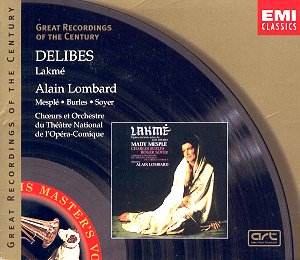Having studied under the composer Adolphe Adam in Paris,
Delibes composed a number of popular operettas before turning his hand
to ballet, achieving fame with Coppélia (1870) and Sylvia
(1876), which Tchaikovsky claimed to be superior to his own Swan
Lake; he also professed to preferring the music of Delibes to that
of both Brahms and Wagner. Delibes was drawn back to opera and composed
three works for the Opéra-Comique in Paris including Lakmé
(1883) in which he followed the current vogue with the 'mysterious'
East, setting the story of the English Officer, Gerald, and the Indian
girl Lakmé, with whom he becomes enthralled having met her after
inadvertently stumbling into a sacred place. Lakmé's father,
Nilakantha, swears vengeance on the infidel who has desecrated the sacred
place. In the dénouement the two lovers drink poison and Nilakantha
is denied his vengeance.
Lakmé, like Bizet's Pearl Fishers (1863),
is full of mock oriental melody, but unlike the latter work has never
achieved widespread production outside France, despite the popularity
of the Bell Song (CD2 tr 3/4) and, more recently, at least in
the UK, of the Flower Duet (CD1 tr6), which was used as part
of an advert for a certain favourite airline (British Airways). The
Bell Song was recorded by Tetrazzini in 1907 and Lily Pons in
1929 and 1944. It was probably the justification for the 1952 recording
of the complete opera in which Mado Robin interpolated an unwritten
high G sharp of which Richard Osborne, in a brief but informative booklet
note, suggests is one of the highest notes ever recorded by the human
voice. Certainly the coloratura demands of the eponymous heroine were
the 'raison d'être' of the 1967 recording with Joan Sutherland
in the name part and Alain Vanzo as Gerald under Bonynge's baton. However
that performance could not be said to be idiomatic despite Vanzo's elegant
singing and that of the other native speakers in the cast. Its drawback
is Sutherland's lack of clear diction however spectacular her coloratura.
Thus the way was open for this 1970 recording by EMI France, which took
time to achieve international circulation. It remained at full price
until being recently displaced by the same company's recent recording
with Natalie Dessay (EMI CDS 556569).
Mady Mesplé, who made her stage debut in 1953,
was a favourite of EMI France. In twelve recently re-issued French operettas
she features in no less than six. Her voice is that of a light lyric
coloratura soprano with a good trill, diction, and clear tone. Her lean
tone, and quick vibrato, allows for a limited range of expression, but
her lack of variety of tonal colour, and at times vocal heft (both of
which Sutherland has in abundance), are serious limitations on her interpretation
of Lakmé's many moods. As Gerald, Charles Burles exhibits a pleasing,
slightly nasal tone. He phrases well and holds a good line; a light
tenor in the French Opéra-Comique tradition, whilst he suffers
in comparison with the vocally assured and elegant Vanzo on the Sutherland
set, he doesn't let the side down. Try CD 1 trl 6-17 where Gerald and
Lakmé meet. Roger Soyer's bass-baritone voice is in the tradition
of Journet; a powerful well-focused instrument. He has a good range,
a warm resonant yet clear voice taking dramatic pressure with a wide
compass of expression and makes an appropriately threatening Nilakantha.
His brief cavatina (CD 1 tr18) and later aria (tr 31) illustrate his
strengths. All the lesser parts are idiomatically taken. Alain Lombard
conducts a dramatic performance, drawing well-focused playing, with
wide tonal dynamic and nuance, from the orchestra. The chorus play a
full and vigorous part, and in a warm yet clear and well-balanced recording,
are heard to good advantage and great benefit to the dramatic whole.
There is a track related synopsis and full libretto with English and
German translations. There are no singer biographies.
A "Great Recording of the Century"? Not really; but
quite enjoyable despite Mesplé's limitations. The Sutherland
set is now available as a Double Decca at about 80% of the price of
this set, and her coloratura is spectacular. This issue has only a track
related synopsis and no libretto, but then words are not exactly the
issue with Sutherland!
Robert J Farr


